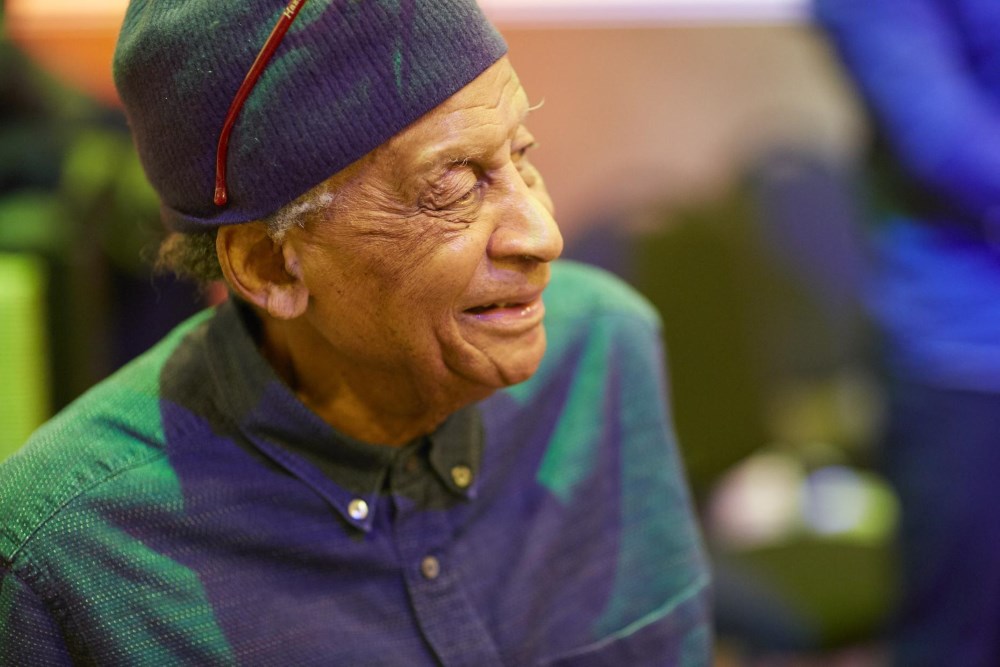South African jazz pianist Abdullah Ibrahim laughs when he remembers a gig he played shortly after he moved to America in 1965. “There was this club in New York and I suggested that I bring my trio,” he recalls. But instead of the typical bass and drums rhythm section, he brought a cellist and a bass clarinetist. “When we turned up they didn‘t want to pay us. They said, ’that‘s not a trio!’”
His choice of accompanists is no longer an issue now that Ibrahim plays concert halls like the Berklee Performance Center, where he’ll perform a Celebrity Series of Boston concert on Saturday with his newest unconventional trio: Cleave Guyton Jr., on saxophone, piccolo, and flute, and bassist-cellist Noah Jackson.
“We have a conversation going, where there’s another way to lay down a meter,” says Ibrahim of the trio, which is captured on his new live album, “3.” ”Instead of a drumbeat, perhaps the beat should be our individual and collective breath and heartbeat. So it leaves people − us musicians, and also the listeners – free to individually engage with the music.”
Ibrahim’s career dates back to the 1950s, when he was known as Dollar Brand and was a member of the Jazz Epistles, a pioneering South African group that also included Hugh Masekela. After leaving South Africa and apartheid to live and perform in exile, Ibrahim was championed by Duke Ellington and became known for a meditative sound that combined Thelonious Monk-influenced jazz with African rhythms and church music.
Speaking from his home in Germany, Ibrahim, who turned 90 last month, mentions that he also was inspired by musicians who played solo stride piano at house parties, as well as the music of South Africa’s Chinese and Indian communities. And then there was a record that his grandmother had. The label was too faded to read and the record player was broken, so Ibrahim had to move the 78 along with his finger. “I kept playing it over and over again and the neighbors were very upset,” he recalls. “But it touched me very deeply. And years later I discovered it was Debussy’s ‘Prelude to the Afternoon of a Faun.”
Ibrahim played the 1965 Newport Jazz Festival and became a regular at Boston-area clubs like Sandy’s, Tinker’s, and the Jazz Workshop, where he fondly remembers meeting B.B. King, who was playing the adjacent Paul’s Mall. After the end of apartheid, Nelson Mandela, who called Ibrahim “South Africa’s Mozart,” invited the pianist to return. Ibrahim has since mentored several generations of South African jazz musicians and recently relaunched his M7 Communities Project, a program that mentors young musicians in music and life skills, including martial arts – Ibrahim holds a black belt.
Today he’s considered one of the fathers of the vibrant South African jazz scene. “There are a lot of brilliant young musicians in South Africa,” he says. “It’s like Charlie Parker said: There will always be some young person who ‘will come along and take the style and really do something with it.’”
Several of those South African jazz talents now make Boston their home, including pianist Witness Matlou and drummer Lumanyano Mzi, and veteran South Africa-born players Stanley Sagov and John Lockwood.
“I can’t think of any South African musician who hasn’t been influenced by Abdullah Ibrahim,” says Matlou, a gifted and thoughtful pianist and composer who has recently been playing in Boston’s Jazz Composers Alliance Orchestra. “His music was really part of what emphasized freedom when South Africa transitioned from apartheid to democracy. One of his tracks, ‘Mannenberg,’ was the soundtrack of the political transition.”
Matlou credits Ibrahim with expanding “the colors and harmonic progressions, and what we see as being possible with piano playing that fuses the South African township sound and groove with jazz improvisation.”
As Ibrahim embarks on his US tour, he’s aware that his audiences have just gone through a divisive election. “I hope that when people come and listen to the music we can have a moment of healing,” he says.
“When I was in high school, my dream was to become a medical doctor, but the system didn’t allow me,” says Ibrahim. “So I’ve always been engaged in this idea of being a healer.
“Musicians are regarded as entertainers, but in the African tradition, if you show any signs of musical ability, you will be drafted into medicine,” explains Ibrahim. “That’s how we overcame apartheid. Mandela, as well as our unsung teachers, would sit with us and explain to us that the most important aspect of our lives is that we must heal.”
Original article written by Noah Schaffer
